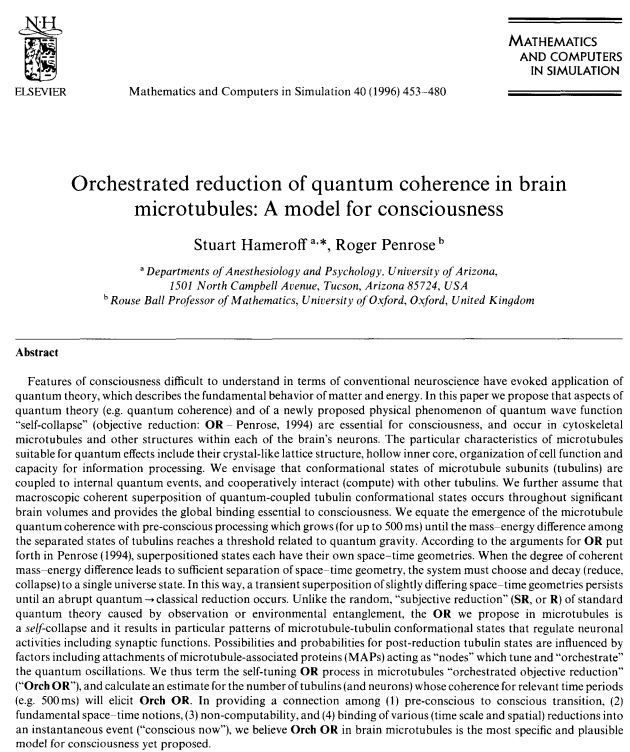

http://www.alice.id.tue.nl/references/hameroff-penrose-1996.pdf
Moderators: Elvis, DrVolin, Jeff


“Obviously, the faster we process information, the more rich and complex our models or glosses — our reality-tunnels — will become.”
http://thenewinquiry.com/blogs/shines-like-gold/triple-decker-weekly-133/
Can people differentiate what they know from what they do not? Several lines of research suggest that people are not always accurate judges of their knowledge and often overestimate how much they know.
http://digest.bps.org.uk/2015/10/feeling-like-youre-expert-can-make-you.html
Feeling like you're an expert can make you closed-minded
What happens to us as we accrue knowledge and experience, as we become experts in a field? Competence follows. Effortlessness follows (pdf). But certain downsides can follow too. We reported recently on how experts are vulnerable to an overclaiming error – falsely feeling familiar with things that seem true of a domain but aren’t. Now a new paper in the Journal of Experimental Social Psychology explores how feelings of expertise can lead us to be more dogmatic towards new ideas.
Victor Ottati at Loyola University and his colleagues manipulated their participants (US residents, average age in their 30s) to feel relative experts or novices in a chosen field, through easy questions like “Who is the current President of the United States?” or tough ones like “Who was Nixon's initial Vice-President?” and through providing feedback to enforce the participants’ feelings of knowledge or ignorance. Those participants manipulated to feel more expert subsequently acted less open-minded toward the same topic, as judged by their responses to items such as “I am open to considering other political viewpoints.”
People’s perceptions of their all-round expertise – provoked in the participants via an easy rather than a hard trivia quiz – also led them to display a close-mindedness in general, even though it was the participants who took the hard quiz who failed more, and reported feeling more insecure, irritable and negative – ingredients that are normally associated with close-mindedness. This isn’t to say that these emotional states didn’t have any effect, just that any effect was swamped by perceptions of expertise.
These findings are somewhat counterintuitive because there are good reasons to have expected the opposite results. Firstly, real-life experts take a long road that involves acquiring and synthesising new information, at times requiring them to flip their way of thinking about things – for instance, a chemist might recall how atoms operated one way in early grade science, only for later schooling to reveal a very different picture. As such, dogmatism is an obstacle to true expertise. Secondly, research on stress and emotion tells us that feeling relaxed and successful – as you might expect an expert to feel more than a novice – encourages open-mindedness.
But Ottati and his colleagues point out that open-mindedness doesn’t exist in a vacuum - it ebbs and flows according to the social situation. It’s not as acceptable to pooh-pooh the content of a university lecture the same way you might do the street demagogue’s patter. The researchers argued too that as well as the situation, your own social role matters, and the "expert" is a social role that gives you permission to opt-out of open-mindedness.
How do we know the closed-mindedness associated with feeling expert was driven by assumptions the participants were making about the social role of expert, and not the effect of some other psychological state? For example, an alternative explanation could be that the participants made to feel expert were overwhelmed by a sense of power, something past research has shown to make contributions from others appear less relevant. We know it must be about social role because the effect was maintained when participants didn’t themselves feel special at all. In another experiment, the researchers asked their participants whether it was justified for someone to ignore the political opinions of other people at a party, when the individual in question was more expert than, more novice than, or similar to the other guests. The hypothetical was framed in two ways: “you are at a party where…” or “John is at a party where…” – in both cases, the participants considered an expert was justified in acting dogmatic.
Taken altogether, how robust are these findings? On the main effect itself (linking feelings of expertise with close-mindedness), note that the sample sizes were quite small – there were only 30-60 participants per experiment. However the effect was uncovered using slightly different methods across six experiments, giving us faith that there’s something real here. However we need to be cautious in how we interpret these results. The study shows us the effect of the social role of expertise, manipulated independently from the true possession of expertise. In other words, the path of acquiring knowledge, and being wrong a lot along the way, may produce countervailing positive influences upon open-mindedness, something not examined in this study. This means we can conclude from this research a narrow but important point: that thinking of yourself as "being the expert" can be an obstacle to open-mindedness.
_________________________________ ResearchBlogging.org
Ottati, V., Price, E., Wilson, C., & Sumaktoyo, N. (2015). When self-perceptions of expertise increase closed-minded cognition: The earned dogmatism effect Journal of Experimental Social Psychology, 61, 131-138 DOI: 10.1016/j.jesp.2015.08.003
tapitsbo » Fri Nov 13, 2015 1:40 pm wrote:Also: if magnets can do this much to our cranium as per AD's article, imagine what cosmic rays et al. are already doing day-to-day.
Wombaticus Rex » Fri Nov 13, 2015 1:56 pm wrote:tapitsbo » Fri Nov 13, 2015 1:40 pm wrote:Also: if magnets can do this much to our cranium as per AD's article, imagine what cosmic rays et al. are already doing day-to-day.
Amen - never bought the "skeptic" argument that there's no medium for ESP, we're fucking swimming in it.
guruilla » Fri Nov 13, 2015 11:34 am wrote:I wonder what Jan Irvin would have to say.

Users browsing this forum: No registered users and 32 guests